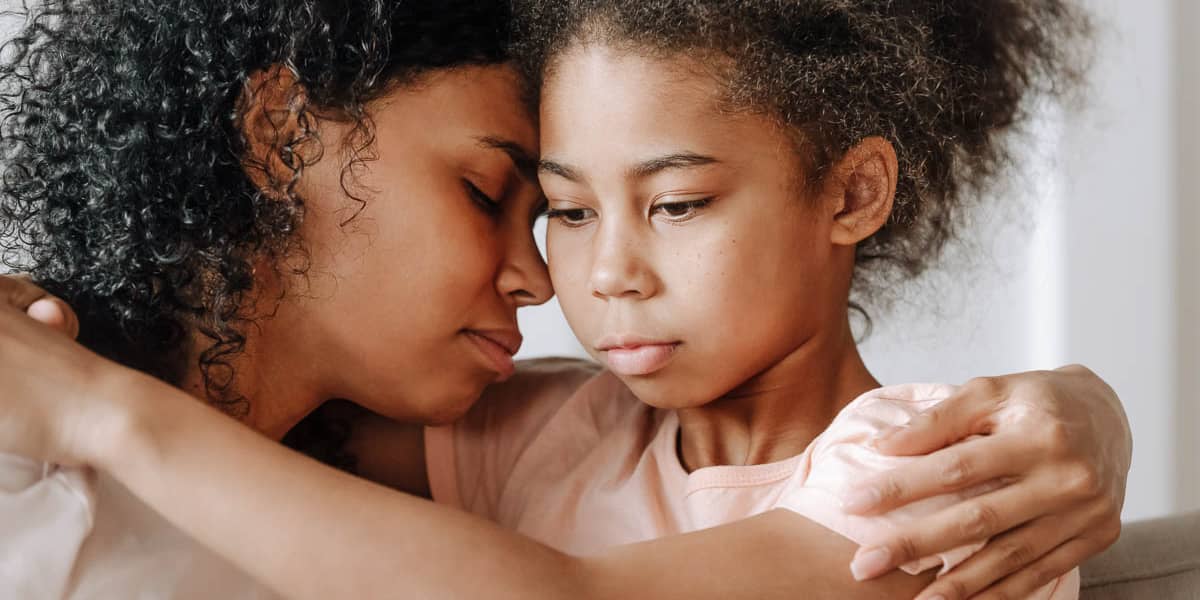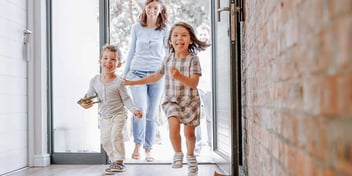Talking to Kids about Divorce and Cancer

If you are going through a divorce and have kids, you've likely been looking for ways to talk to them about what's going on. You may have read some of the great resources and articles here on Hello Divorce about co-parenting, like How to Succeed at Raising Your Kids Together, Apart, or 5 Co-Parenting Plan Resources We Love. If you have, you'll have seen several mentions of Mighty + Bright, a wonderful product developed by Sara Olsher.
I adore Mighty + Bright and refer many of my clients to their products: magnetic calendars that help children visually see and understand their schedules. As I often say on this blog and elsewhere, when people feel informed, they feel empowered. Empowerment, in turn, reduces stress, anxiety, and anger. The same goes for our kids.
Meeting Sara Olsher
When I first met Sara Olsher, founder of Mighty + Bright, I was a little starstruck. I had followed her company and her story and so admired her raw honesty and deep desire to help other parents through a situation that had challenged her.
But her products and story don't end with Sara's divorce.
In 2017, at age 34, Sara was diagnosed with invasive breast cancer. As she did with her divorce, she decided to explain the diagnosis and treatment process to her then-six-year-old daughter rather than keep her in the dark.
She also developed a calendar to help her daughter understand her cancer treatments, which included magnets for "good" days, "bad" days, chemo days, and more. And she channeled this experience to develop discussion guides to help parents talk to their kids about cancer, as she did with her own daughter.
There is so much we can all learn from Sara's strength, honesty, and bravery. It is an absolute delight to introduce you to her through this Q&A.
Erin: You've been through so much. Let's start with divorce and co-parenting. Your divorce is now seven years in the rearview mirror. Can you talk about your co-parenting relationship with your ex today and how it has evolved since your divorce?
Sara: Things have gotten so much easier. Honestly, I had very little hope in the beginning that we'd ever get to a good place. We had a very contentious divorce and couldn't agree on much of anything, including how to handle our daughter's anxiety.
In the beginning, our co-parenting relationship was much more like parallel parenting. We each did our own thing. However, we've been divorced for seven years, and we get along fine now. While I wouldn't say we are friends, we do things together for the benefit of our daughter, like playing games and periodically sharing a meal.
Erin: You have a background in psychology, and you've credited that for helping you realize your daughter was having a hard time understanding what was happening during your divorce. What signs should parents who don't have a background in psychology look for in their kids as a divorce progresses?
Sara: Kids who are struggling with divorce have different reactions depending on their personalities. The most common things to watch for are signs of anxiety – especially separation anxiety, where a child doesn't want to separate from their parent – as well as anger and tantrums. Kids may not ask questions directly, especially if they're young. It's up to us to relay the important points to them repeatedly. There are a few things you need to reassure them about:
- They are loved, and that will never change.
- Nothing they did caused the divorce.
- They will see the other parent. (Tell them when, and let them know how they can contact the other parent, such as FaceTime.)
"Kids really need routines to feel safe. Keeping life as predictable as possible will do wonders. That's why I created both Daily Chart, which helps kids see that every day begins and ends the same way. Kids are visual learners and usually need concepts repeated multiple times before they truly learn." – Sara
Erin: I love the charts and calendars you've developed. Can you share a bit more about why you think these are so useful for helping kids understand and process?
Sara: I created the calendar to help kids understand when they'd see each parent. My daughter was only 18 months old when her father and I separated. It didn't take long for me to realize that she needed something visual to consult so she'd understand when she'd see her dad next. Many parents use the calendar when telling their kids about the divorce. During a very hard emotional conversation, it provides some solid ground.
The Daily Chart is useful for a few reasons. First, it helps kids understand that every morning and every evening are the same. This gives them a sense of security in an otherwise turbulent time.
"Routines help kids see the ways in which each home is similar and different and to understand what is expected of them. Less confusion equals less stress and anxiety." – Sara
For older kids, the Daily Chart has the added benefit of acting as a visual to-do list. This helps teach independence and responsibility. In other words, you need to nag less. It also helps parents connect with their kids daily by incorporating things like "cuddle time" and "counting blessings" into nighttime routines.
When you're going through something really hard, there can be a real sense of urgency. I don't want people to have to wait to have that conversation.
Erin: You were diagnosed with cancer just a few years after your divorce. Did that diagnosis change your relationship with your ex when it came to co-parenting your daughter? What advice can you share with others in similar situations?
Sara: I was really nervous to share the news of my cancer diagnosis with my ex. I was concerned that he might throw a custody curveball at me, and I'd find myself fighting for custody again instead of focusing on my health. However, for the most part, he was incredibly accommodating. Being divorced actually ended up being a blessing, believe it or not. During my surgeries, my daughter went to her dad's house. I knew she was excited to play with her new baby brother, which helped alleviate my guilt. My ex was really flexible, which was very helpful. It helped me trust him a bit more.
We switched weekends when I had chemo, so on my worst days, I didn't have to worry about her seeing me at my lowest – nor did I need to worry about keeping her entertained.
Erin: You have been through so much in the last seven years. And so has your daughter. Thinking about all you've already been through together, and all that lies ahead, what makes you most proud of her?
Sara: You know, I don't think she understands how much all this has affected her life. She doesn't have much to compare it to. She doesn't remember her father and me ever being together. As for cancer, unfortunately, I think she thinks it's much more common than it actually is. My mom is also a two-time breast cancer survivor. Cancer had its blessings for both my daughter and me, even though I was no fun at all during treatment, and her second-grade year was pretty rotten. For example, my mom and boyfriend moved in with us for five months. This gave her other people to trust. At some point, I hope she will look back and realize how strong these trials have made me and know that she can also face hard things herself.
As for our relationship now, I am incredibly thankful for it. My years as a single mom made us very close, and my ordeal with cancer made me realize what's important in life. I try to work a bit less and focus on her more.
Erin: And finally, looking back seven years ago, what is one piece of advice, or one thing you know now, that you wish you could tell yourself back in 2012 when you were going through your divorce?
Sara: Be patient with the process. Going through a divorce means finding yourself again, and that can't be rushed. Don't try to force the healing.
Wise words to end on.
FAQs
How do I talk to my kids about both divorce and cancer at the same time?
Use simple, age-appropriate language, share only what they need to know, and reassure them of your love and support. Stick to the facts without overwhelming details and leave space for their questions.
Should I talk to each child separately or together?
It depends on their ages and personalities. Younger kids may do better with joint conversations, while older children may need private time. Either way, keep the core message consistent.
What if my kids react with anger or withdrawal?
Big reactions are normal. Stay calm, validate their feelings, and remind them you’re there. Offer professional support if emotions become overwhelming or persistent.
How much detail should I share about medical treatment?
Give basic information that helps them understand what will change in their lives, such as hospital visits or fatigue. Avoid frightening details unless your child asks directly and seems ready.
How can I help kids feel safe and supported during this time?
Keep routines predictable, give them roles where appropriate, and emphasize the team of adults who will care for them. Encourage open expression through talking, drawing, or play.
What resources can support me and my children?
Counselors, child therapists, school staff, and support groups can help. Books for kids about divorce and illness also provide language and reassurance.
How to Talk to Kids About Divorce and Cancer
Plan the conversation
Decide together with your co-parent what to share and how. Keep the message simple, truthful, and consistent across both households.
Use clear, age-appropriate language
Explain the basics of divorce and illness in words your child understands. Avoid unnecessary details that might cause confusion or fear.
Reassure them of love and care
Emphasize that both parents and other caregivers will continue to support and love them, even though routines may shift.
Acknowledge and validate emotions
Let kids know it’s normal to feel sad, angry, or worried. Encourage them to express emotions through talking, drawing, or play.
Maintain predictable routines
Keep bedtimes, meals, and school activities as steady as possible so kids feel anchored during change.
Offer professional and community support
Reach out to counselors, teachers, or support groups if your child needs extra help processing the changes.

Ready to re-discover yourself with coaching or therapy?
Our FREE checklist can help you find the right fit.
Download our checklist of questions to ask a potential therapist or coach today.



